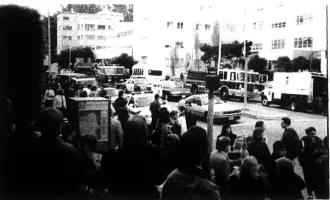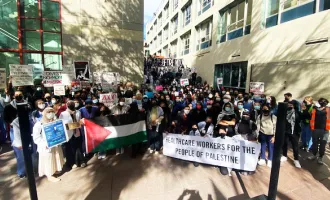
Grad Slam Winners Simplify Science
An enthusiastic environmental engineering student from UC Berkeley took home the top Slammy award — just beating out UCSF’s finalist — at this year’s annual UC-system wide Grad Slam competition on May 3.
UC Berkeley’s Joseph Charbonnet gave a captivating three-minute talk outlining his invention, called “Man Sand Filtration,” an innovative way to filter putrid stormwater into potable water after torrents of rain flood a city street. The system uses manganese oxide mixed with sand to remove pollution from water.
“No, it’s not called ‘Man Sand’ because it refuses to stop and ask for directions,” Charbonnet said.
UCSF’s favorite, Yiqi Cao, earned second place with her presentation, “Don’t go breaking my heart… again,” describing a new stent that take uses the natural ways cells travel to prevent native human cells from interfering with the device’s function.
Third place went to UC Merced’s Portia Mira for promising a solution to antibiotic resistance. And public favorite went to Mengya Tao from UC Santa Barbara who shared better ways to test chemicals for harmful effects.
The fourth annual UC Grad Slam competition invited 10 UC graduate students across disciplines competed to the LinkedIn headquarters in San Francisco to best their peers at scientific storytelling. Contestants had just three minutes to convey their thesis research with as little jargon and as much enthusiasm as possible.
The event can be used as a tool for improving our scientific findings and ideas. Each presentation is an example of how to communicate effectively across a breadth of disciplines.
Each contestant used a distinct strategy that you may personally relate to or be inspired by. There are also clear communication techniques shared amongst the talks, like pausing between points, using graphics and voice, and maximizing metaphor.
Six judges evaluated the creative demonstrations on clarity and effectiveness at delivering complex ideas to a general audience. Judges also span disciplines. This year, they included: Guy Berger, economist at LinkedIn; Neil Chase, executive editor of The Bay Area News Group; Lark Park, UC Regent and senior policy advisor to Gov. Jerry Brown; Karen Duderstadt, chair of the UC Coordinating Committee on Graduate Affairs and a professor of family health care nursing at UCSF; Julia Avila, a senior at Gateway High School in San Francisco and co-president of the Gateway debate team; and UC President Janet Napolitano, who led the event.
Winners shared an $11,000 prize at this UC system-wide event, and an additional $1,000 prize for the public favorite.
I would certainly be nervous stepping up in front of this panel, aiming to craft a story that is equally appealing to an economist and a high school student. Not just any story – the complicated mess of terminology and “disprove only” approach that is science.
But the finalists didn’t just step out of their labs and onto this main stage. These 10 students were finalists after months of qualifying competitions at each of their UC schools.
In addition to the good fun of competition between schools, this event is important because it celebrates the dissemination of scientific knowledge to the masses.
An obligation of the scientific field, especially when funded or run by government institutions, is to ensure that the public has fair access to the information. This translates of course into medical advances, but it is not as monetarily incentivized to make sure our neighbors and school teachers, economists and students can each understand the latest scientific breakthroughs.
Greater public understanding can not only bolster support of scientific advances, and dissuade the fear or even apathy prevalent in pop culture, but also places value on a discipline in the minds of our youth. We always need more thinkers, more creative perspectives as we turn our world over in our hands trying to understand.
Mind also that understanding even between scientists is challenging. Breaking into a new field or attempting a cross-disciplinary approach in our own work is not as simple as picking up a relevant journal article. It’s picking up 5, 10, 20 and frantically searching the internet to define acronyms. It’s diving down the never-ending hole of cited papers to understand where assumptions originated, or sometimes even what techniques were used.
Whose job is it to take these recorded packets of information and make sure the community utilizes them? That’s the point of publication in theory, but the gap only grows as each field dives deeper into the minutiae.
How much better would our understanding be, our medicine and healthcare, our techniques and experimental design, if access to the work of our peers and predecessor were better facilitated?
You can still watch the recording of these rapid-fire science bullets here.
The full list of top 10 UC public storytellers includes:
Joseph Charbonnet, UC Berkeley – “A stormwater solution”
Tooka Zokaie, UC Davis: “At the mouth of health access”
Alana Ogata, UC Irvine: “The future of early detection: an at home cancer test”
Marissa Stevens, UCLA – “Near Eastern languages & cultures: social identity from ancient Egypt to modern times”
Portia Mira, UC Merced: “Reversing antibiotic resistance”
Nicholas Root, UC San Diego: “Language and synesthesia”
Yiqi Cao, UC San Francisco: “Don’t go breaking my heart… again”
Mengya Tao, UC Santa Barbara – “A safer world with fewer regrettable chemicals”
Kimberley Kanani Bitterwolf, UC Santa Cruz: “Decoding Earth’s erratic history”
Jessica Noll, UC Riverside – “A rapid blood test for stroke”



